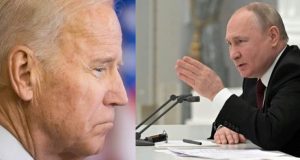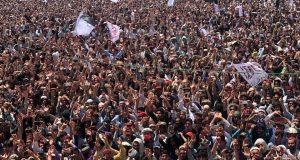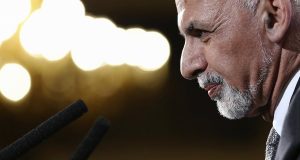Officially Pakistan is supposed to be in the final stage of preparation for general elections to be held in summer this year as the elected National Assembly and Provincial Assemblies are reaching the end of their constitutional term on May 30 ( the last day of the constitutional life of Pakhtunkhwa Assembly is May 28). Care taker governments, at both federal and provincial levels, are to be set up before that date as per provisions of the Constitution so that they take over power with the end of the sitting government. But that’s what is expected if we go by the constitutional fiction. On the ground the creeping coup against the elected government going that’s going on for the last four years has entered its final stage. In the first stage the federal government was destabilized by a scripted aggressive agitation in Islamabad. At the peak of that putschist onslaught Imran Khan of PTI who has played the role of instigator-In-Chief predicted the rise of “ umpire’s finger” ( an euphemism for Army Chief’s intervention) but that was not to be as political parties closed their ranks for defending constitutional system. Religious extremists/militants who enjoy close links with the deep state were also unleashed as an additional factor for choking Islamabad. Lahore, known as political bastion of Muslim League ( N), also came under siege of religious extremists as part of the destabilization agenda.
The final part of the onslaught on the government is spear headed by the higher judiciary ( that’s why it is known as judicial martial law). After disqualifying Prime Minister Nawaz Sharif on what is recognized to be very weak legal grounds by all and sundry the judiciary is going after the stalwarts of Nawaz Sharif’s party to bar them from contesting elections. At the same time the deep state is herding the so called electables of all hues and parking them in PTI which is now beyond any shadow of doubt the new king’s party. But the matter of more serious concern is the continuous contraction of democratic freedoms in general and that of freedom of expression in particular. Illegal pressure on tv channels is proving effective as neither the civilian government nor the Supreme Court were able to protect media against crude methods of pressure employed by the intelligence agencies under the control of army. Print media, even some English language dailies known for their liberal views were forced to decline articles written by a number of independent authors. University campuses have also seen cancellation of a number of functions not approved by the intelligence agencies. These are negative and disappointing developments for democratic polity, particularly so as they cast a long shadow over the forthcoming elections. What aggravates this problem is the surrender of political parties to the creeping coup. Most of the political parties are silent as they have embraced the survival mode by making separate deals with the deep state.
But there is only one development in Pakistani politics which is totally new and unprecedented and which has become a pain in the neck for the security establishment. It is without any doubt the dramatic rise of the three months old Pashtun Tahafuz Movement ( PTM ), a Pashtun youth movement originating from tribal region of Waziristan and spreading into urban centers of the country like a wild fire. The spontaneous and amorphous but popular and dynamic youth movement has proved its resilience and persistence in the face of state sponsored vicious propaganda, media blackouts, arbitrary arrests and harassment. The most critical thing about this movement is that it has effectively challenged the state narrative on Taliban, military operations in Federally Administered Tribal Area ( FATA) and war in Afghanistan after 9/11. The young leaders have first hand authentic information and powerful personal stories directly coming from the victims about death, destruction and displacement brought about by the state patronage of Taliban. This is “ dangerous “ because it is blowing away the narrative carefully crafted by Pakistani security establishment about the “ spontaneous “ rise of a Taliban. But despite the insinuations coming from the military leadership about PTM being an “ engineered movement “ the doors for negotiations were not closed in view of the strong popular support that this Pashtun youth movement has attracted. The recent successful rally of PTM in Lahore has demonstrated its ability to effectively communicate with all Pakistanis including the masses in Punjab. It plans to hold rallies in Swat and Karachi in the near future. With Karachi rally the new movement will complete the cycle of mass mobilization in all the four provincial capitals of the country. With this track record it wouldn’t be possible for the detractors to dub the movement as narrow ethnic or secessionist movement. The form of the movement may be rooted in Pashtun identity politics but its powerful content is democratic and rights based attractive for all oppressed people.
The top leadership of the army has informally exchanged views about PTM with political leaders, parliamentarians and prominent sitting and retired civil and military officers. The most remarkable thing about these informal exchanges has been the universal demand of the Pashtun political class across the political spectrum for peaceful engagement with PTM instead of pushing it to the wall. They same word of advice has emanated from the sitting and retired Pashtun officers. It was in this context that statement by the Corpse Commander Peshawar about starting talks with the young leaders was regarded to be a positive development which was welcomed by all. But the subsequent arrests of PTM activists in Lahore and Karachi and the continuous vicious propaganda campaign against it indicates that hard liners in security agencies are refusing to fall in line with the decision of peaceful engagement with Pashtun youth. These elements are naturally worried that any probe in FATA’s recent history will unearth their illegal and criminal misdeeds. But one hopes that the tail will not be allowed to wag the dog.
Seen as a whole the picture of Pakistani politics is quite dismal. The current creeping coup ( judicial or otherwise) is going to create new problems instead of solving the old ones. Political parties need to wake up to the reality of the expanding shadows of authoritarianism that is seriously jeopardizing democracy. It’s not just about Mian Nawaz Sharif or his party. It’s about democracy, the future of the people and the country. The path of military controlled state system with appeasement of extremism and terrorism will lead the country to international isolation and internal implosion.
By Afrasiab Khan Khattak: The writer is a regular contributor to THE PASHTUN TIMES. He is a retired senator and a leader of Awami National Party (ANP). He tweets @a_siab
 Pashtun Times Latest News
Pashtun Times Latest News




